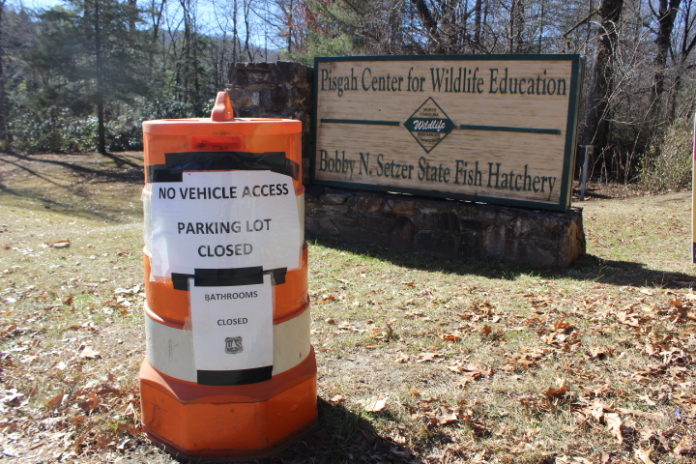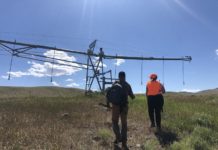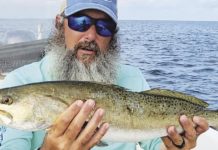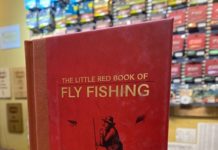When Tropical Depression Fred tore through Western North Carolina in August, among the casualties was the Pisgah Center for Wildlife Education. The Pisgah Forest hub for learning about fishing, hunting and the great outdoors suffered severe damage — as volunteer Steven Gutierrez, who was on the property during the storm, vividly recalls.
Water started rushing down the Davidson River and began covering the pools at the adjacent Bobby N. Setzer Fish Hatchery, Gutierrez says. And then, it started rushing into the center itself.
“After that, we pretty much had to get out of there. It was starting to get pretty high,” he tells Xpress. “There were at least thousands of trout in the parking lot. You didn’t know what was going to happen. Where that place is, you have no cellphone reception. I couldn’t even call my parents.”
The damage to the Pisgah Center was so dire that, in October, the N.C. Wildlife Resources Commission’s executive board decided to cut its losses. No funding will be allocated to repair the damage; instead, the center will be closed permanently and demolished on a timeline yet to be determined.
In its place, according to NCWRC Division Chief of Wildlife Education Travis Casper, will go an expansion of the Setzer Hatchery. The facility, the commission’s largest trout hatchery, had already been scheduled for some new construction in 2022.
Casper says the expanded hatchery will now include an educational component to provide learning opportunities about trout production, management and fishing skills.
In memoriam
The Pisgah Center was located in Pisgah National Forest off U.S. 276 near Brevard. Along with taking classes, visitors could view exhibits about WNC’s rich native biological diversity — both aquatic and terrestrial — conservation and the environment.
Residents of the area are saddened by the decision to close the center. Oskar Blues Brewery bartender Michael Plauche calls it a substantial loss for the community.
“Anytime people come here to camp, it was one of the stops,” he says. “You got to see fish up close, and there were snakes and plenty of other animals. It was good for educational purposes. Not everybody’s going to have time to spend a few nights hiking, but anybody could go in there and see wildlife and get a sense of the forest.”
Another Brevard resident, Michele Barg, tells Xpress that the town and its surrounding hiking trails, and by extension the Pisgah Center, were a destination. “People come here for vacation from all over the world,” she says. “People come here with kids. [The Pisgah Center] was a good place to go if the weather was bad. It’s a loss for everybody.”
For residents, Barg continues, the center’s classes covered both practical skills, such as compass use, and general education on topics like plate tectonics and mountain formation. But she says that those offerings had been on the decline in recent years. (Casper says the NCWRC regularly reviews its educational programs “to ensure they align with our agency’s mission, match the purpose-designated funding sources and continue to serve the public’s interests and needs.”)
And fellow resident Josiah Weeks says he often took his 2-year-old son to the center before it closed. “He didn’t understand a lot, but he loved going in and looking at the fish,” he says.
Kevin Howell, owner of Davidson River Outfitters in Pisgah Forest, which sells fly-fishing equipment and offers guide services and classes, says his business hasn’t yet been affected by the closure of the Pisgah Center. But he believes the pause in its fly-fishing classes will likely bring more people looking to learn to the sport to his door.
Silver linings
Despite the flooding and the center’s closure, Casper suggests that things could turn out better than before for the region’s nature lovers. He says the commission is using the closure as an opportunity to expand partnerships between other facilities around the region, such as the Armstrong and Marion fish hatcheries in McDowell County and DuPont State Recreational Forest.
“Our agency was already elevating our educational operations across the state,” he explains. “The flood at Pisgah forced us to reevaluate the center earlier than scheduled and presented us with the opportunity to refocus and increase our hatchery footprint and gain efficiencies in education and fish production for the state.”
The Pisgah Center’s former staff will also see new duties, offering in-classroom presentations on aquatic life at schools and on-site instruction at parks and waters around the area. And the newly expanded Setzer Hatchery will continue to offer its raceway tours, which show how trout are bred from eggs into full-grown fish that maintain a healthy population in WNC waters, as well as fly-fishing classes.
“It’s important because there are a lot of sales of hunting and fishing licenses,” Casper says. “This way, we can support wildlife and manage species — and maintain connections with the public and the relevance of the agency.”
Credit: Source link































